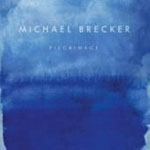Home » Jazz Articles » Album Review » Michael Brecker: Pilgrimage
Michael Brecker: Pilgrimage
During the months of his courageous battle, a larger public became aware of not only an outrageously talented, indisputable master of the archetypal jazz instrument, the tenor saxophone, but of a generous and gentle human being—unassuming, personable, a loving father and family man. When the end came, it was neither a sudden shock (the road has taken a severe toll on musicians) nor one that could be implicitly interpreted as "self-inflicted" (drug addiction, alcoholism, smoking, etc.). Then came the recording of Pilgrimage which, accurately or not, is being viewed as something more—a planned valedictory, a final testament, a visionary requiem. Its posthumous release has understandably taken on significance beyond the commercial, the aesthetic, and the historical: it's become a spiritual journey—from conception, to execution, and finally to its reception as a kind of otherworldly message from Brecker himself (I can almost see the modest Brecker bemused, perhaps even a bit amused, by much of the fanfare and fuss).
The playing is that of a master in full possession of all his considerable powers (reminiscent of pianist Bill Evans on the sixteen CDs worth of music recorded less than a week before his death). The ensemble playing on "The Mean Time" is rhythmically and melodically intricate, tightly executed yet replete with inspired interplay and freeness. And for all the energy being expended, the musicians are listening to each other, working with dynamics and tension-release techniques over modal scales and within textures that are polyphonic, bringing as much attention to the group as to the individual soloist. "Tumbleweed" is another example of a high-intensity, intricate, polyphonically rich piece. Metheny's synthesizer-processed guitar solo might seem risky (should it come to be seen as dated gadgetry) because it precedes a majestic Brecker solo, which sets up an almost equally exhilarating, two-handed polyrhythmic turn by Mehldau on acoustic piano.
It's an impressive session by exceptional players who are on their game. Is it a "work of art"? Is it a "classic"? Is it the "best" jazz album of the new millennium? Of Brecker's career? Maybe we'll know—in time. For now, best to enjoy it. Brecker's assimilation of Coltrane's innovations was not unlike Sonny Stitt's translation of Parker's new language. And there's always room for yet another superlative session by either player.
Track Listing
The Mean Time; Five Months from Midnight; Anagram; Tumbleweed; When Can I Kiss You Again?; Cardinal Rule; Half Moon Lane; Loose Threads; Pilgrimage.
Personnel
Michael Brecker
saxophone, tenorMichael Brecker: tenor saxophone, EWI; Pat Metheny: guitars; Herbie Hancock: piano (1, 5, 6, 9); Brad Mehldau: piano (2-4, 6, 7); John Patitucci: bass; Jack DeJohnette: drums.
Album information
Title: Pilgrimage | Year Released: 2007 | Record Label: Heads Up International
< Previous
Cecilia Smith: Chronicle Of A Life Em...
Next >
Family First
Comments
Tags
For the Love of Jazz
 All About Jazz has been a pillar of jazz since 1995, championing it as an art form and, more importantly, supporting the musicians who create it. Our enduring commitment has made "AAJ" one of the most culturally important websites of its kind, read by hundreds of thousands of fans, musicians and industry figures every month.
All About Jazz has been a pillar of jazz since 1995, championing it as an art form and, more importantly, supporting the musicians who create it. Our enduring commitment has made "AAJ" one of the most culturally important websites of its kind, read by hundreds of thousands of fans, musicians and industry figures every month.



















